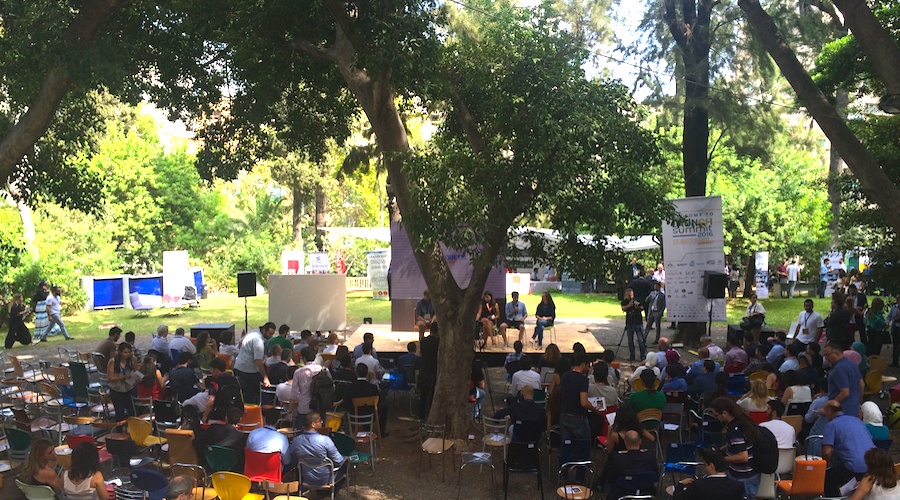Launch Summit experts advise entrepreneurs to begin with solving local problems

“Right now is a good time to be an entrepreneur… Ten years ago, if you said you’re an entrepreneur people thought you couldn’t get a job, and now this is real,” said Andrew Hyde from Techstars.
Unlike most conferences in the Lebanon, AltCity’s Launch Summit stood out in both its venue and content. With more than 50 partners including Techstars, Smart ESA Business School, Torch, UNICEF Lebanon, and Berytech, the event was a must attend for early stage startups looking for inspiration and guidance.
Hundreds gathered at the woody campus of Ecole Superieure des Affaires (ESA) to pitch, lecture, debate and collaborate. For a relatively small ecosystem like Lebanon’s, most refreshing were the list of international guests including Hyde from Techstars, the world’s largest accelerator, and Luke Iseman from Y Combinator, often called the most powerful global startup accelerator. Other international highlights include Luke Krueger, president of VA Angels, Canada’s most active angel investment groups, and Matteo Bartolomeo from Italy’s Avazi think tank.
Throughout the day, three themes hovered above the rest: Think local problems with global impact; simple hardware, and remember: your idea is worthless.

Solve local problems
“Make your laundry list of excuses on why this country is not as good as it can be, and start with that,” said Iseman.
Many of the panelists at the event encouraged would-be entrepreneurs to take advantage of Lebanon’s chaos and shortcomings. In one discussion, titled ‘The bigger the problem, the bigger the opportunity,’ Asmahan Zein discussed how Aramex was founded out of a need for delivery services in the midst of Lebanon’s bloody civil war.
By solving your environment's problems you are also ensuring you are directly in touch with your target audience. It does not, however, mean your solution cannot be solving a global problem as well.
“Use your environment for what it’s good at. We’re about to have political turmoil in the US,” said Iseman. “We can learn a lot from people who have had turmoil for a lot longer.”
Think simple hardware
There is a need for more simple hardware solutions, discussed panelists. While software solutions remain desirable, some infrastructure solutions like better water pipes, improved waste water solutions or smarter roads have a guaranteed global reach.
Hardware solutions no longer take a lot of time and are expensive, noted Iseman. An example given of a successful hardware startup is Mexico city-based Nebia showerhead that uses 70 percent less water, the company says. Other hardware innovations highlighted by James Cranwell-Ward, innovation specialist at UNICEF Lebanon included the Raspberry Pi, used to help educate young Syrian refugees across Lebanon, and the Digital Drum, a solar-powered computing kiosk.
Cranwell-Ward noted that the notion that social innovation solutions do not make money is false. He encouraged startups thinking of solving for social needs to reach out UNICEF’s Innovation Lab.
But before jumping to hardware, assess if your heart is in it, warns Hyde.
“I want people with passion to try it out. If you don’t have a passion – don’t search for something that other people think is cool,” he said.

Your idea is worthless
Assuming your idea is gold and keeping it a secret is counterproductive. Unless an entrepreneur has tried the idea and proven users want the product, then the idea is worthless. When coming up with an idea, entrepreneurs should be keen on sharing it with everyone they know. Discussing the product only helps improve the idea rather than encourage copy-cats.
“We had over 200 people copy the Startup Weekend model, and I can’t name one of them. I was fearful at first when I should have reached out to say how I can support,” said Hyde.
The Launch Summit also included a pitching competition by early stage startups, workshops and talks including yoga for success, corporate entrepreneurship, global trends in sharing economy, and preparing for investment in Lebanon. Panels also hosted talks by local and regional entrepreneurs, such as May Khalil of Beirut Marathon, Michel Elefteriades of Music Hall, and Walid Hanna of Middle East Venture Partners, and Sami Ismail from Syria’s Intellect.


